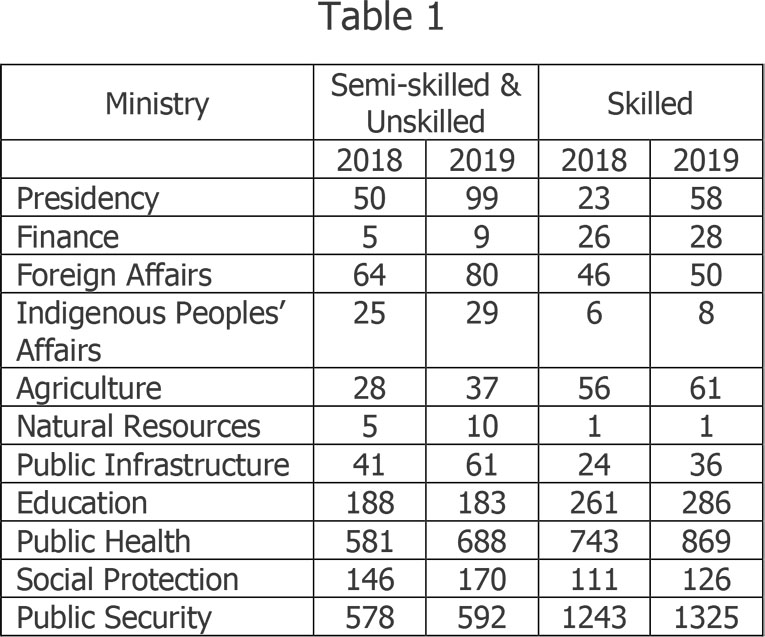Dear Editor,
With great respect, there are some views (not necessarily facts) which emerge from SN’s Editorial of March 12 ` Raising standards in the Public Service’, with which several would disagree.
Starting with the descriptor ‘Public Service’, there is just the implication that the terminology was not formally instituted since our independence, when the change from ‘Civil Service’ was made.
So long established as it has been, it is by no means an administrative structure peculiar to Guyana.
On the contrary while the GRA and the NIS are portrayed as each providing services, they are legally established by individual Acts. They are certainly not ‘Public Service’ agencies, within the purview of the National Estimates approved by Parliament.
In this connection, it is arguable that the Audit Office of Guyana provides a critical ‘public service’, albeit as a Constitutional agency.
Incidentally, too many persons, including Parliamentarians, overlook the fact that the Georgetown Public Hospital Corporation is in fact registered under the Companies Act. (May be the reason its services to the public are reported to be inadequate.)
Without appearing to be overly contentious, it is open for discussion as to what could otherwise be the entry qualifications expected of standard secondary school-leavers.
Incidentally, it is by no means an accurate assertion that there was no (entry level) training over the last ‘four decades’. Quite the contrary, up to the time of the recent opening of the Staff College, there functioned a Public Service Training Centre in Vlissengen Road, Lodge; while the Guyana Management Institute focused on senior personnel. Further, as a member of the National Personnel Officers’ Association at the time, the writer could attest to collaborating with senior officials of the Public Service in conducting training courses for both public servants and private sector managers at Red House, High Street, Kingston, where now resides the Cheddi Jagan Research Centre.
Against that historical background, it is hardly arguable that the launch of the Bertram Collins Staff College (which purported to replace the aforementioned institutions) was a step in the right direction.
The interesting fact is, that it caters for the same entry level school-leavers mentioned in your commentary. The latter responded to a public advertisement which offered ‘to prepare them to become Permanent Secretaries by the time they were forty years old’.
One cannot help but wonder where exactly is the capacity in the Public Service, not only to absorb forty new clerical levels annually, and for an indefinite period; but further to promote so many to the position of Permanent Secretary. The one year programme, to put it very mildly, is less than adequate anyhow.
The Staff College simply does not have the capability to address the more identifiable performance needs of employees of what are described as ‘State Agencies’.
Incidentally, the latter do not have to be part of the Public Service. They are already under the official umbrella of the ‘Public Sector’.
None of the above is intended to gainsay the fundamental fact that performance in the Public Service is chronically low, and the delivery rate unacceptable.
The problem really starts at the very top – where inexperienced, and untutored, political management refuse to learn from their mistakes, and from such perspectives as expressed in SN’s editorial.
In the meantime however, there is the misperception that only senior personnel, including Permanent Secretaries, are recruited on contract. Reference to the National Estimates of 2019, would reveal ‘Contracted Employees’ recruited to the several categories of employment across the Budget Agencies, and including ‘operatives’.
The following Table 1, while not indicating that all are contracted employees, gives a fair implication, if only of increases from one year to the next.
Meanwhile, the lowest level operatives who populate the work forces of the Regional Administration were numbered as follows in 2018.
The above figures, including categories of skilled, semi-skilled and unskilled employees, provide cause for immediate concern, as there appears to be no recognised mechanism in place to upgrade the chronic levels (over four decades) of ‘semi-skilled’ and ‘unskilled’ to that of ‘skilled’.
Questions need to be asked, as vociferously as possible, about:
which authority does the grading
which mechanisms are in place to upgrade the career ‘unskilled’ and ‘semi-skilled’;
not to mention the higher level of contractees whose standards also desperately need to be raised.
Where is the strategy for the development of this wide range of human resources to adapt to an ‘energised’ economy, about which there is so much talk?
Yours faithfully,
E.B. John








